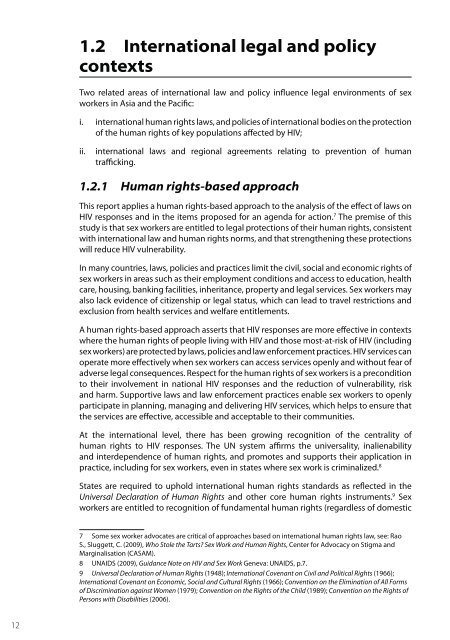SEX WORK AND THE LAW - HIV/AIDS Data Hub
SEX WORK AND THE LAW - HIV/AIDS Data Hub
SEX WORK AND THE LAW - HIV/AIDS Data Hub
Create successful ePaper yourself
Turn your PDF publications into a flip-book with our unique Google optimized e-Paper software.
1.2 International legal and policy<br />
contexts<br />
Two related areas of international law and policy influence legal environments of sex<br />
workers in Asia and the Pacific:<br />
i. international human rights laws, and policies of international bodies on the protection<br />
of the human rights of key populations affected by <strong>HIV</strong>;<br />
ii. international laws and regional agreements relating to prevention of human<br />
trafficking.<br />
1.2.1 Human rights-based approach<br />
This report applies a human rights-based approach to the analysis of the effect of laws on<br />
<strong>HIV</strong> responses and in the items proposed for an agenda for action. 7 The premise of this<br />
study is that sex workers are entitled to legal protections of their human rights, consistent<br />
with international law and human rights norms, and that strengthening these protections<br />
will reduce <strong>HIV</strong> vulnerability.<br />
In many countries, laws, policies and practices limit the civil, social and economic rights of<br />
sex workers in areas such as their employment conditions and access to education, health<br />
care, housing, banking facilities, inheritance, property and legal services. Sex workers may<br />
also lack evidence of citizenship or legal status, which can lead to travel restrictions and<br />
exclusion from health services and welfare entitlements.<br />
A human rights-based approach asserts that <strong>HIV</strong> responses are more effective in contexts<br />
where the human rights of people living with <strong>HIV</strong> and those most-at-risk of <strong>HIV</strong> (including<br />
sex workers) are protected by laws, policies and law enforcement practices. <strong>HIV</strong> services can<br />
operate more effectively when sex workers can access services openly and without fear of<br />
adverse legal consequences. Respect for the human rights of sex workers is a precondition<br />
to their involvement in national <strong>HIV</strong> responses and the reduction of vulnerability, risk<br />
and harm. Supportive laws and law enforcement practices enable sex workers to openly<br />
participate in planning, managing and delivering <strong>HIV</strong> services, which helps to ensure that<br />
the services are effective, accessible and acceptable to their communities.<br />
At the international level, there has been growing recognition of the centrality of<br />
human rights to <strong>HIV</strong> responses. The UN system affirms the universality, inalienability<br />
and interdependence of human rights, and promotes and supports their application in<br />
practice, including for sex workers, even in states where sex work is criminalized. 8<br />
States are required to uphold international human rights standards as reflected in the<br />
Universal Declaration of Human Rights and other core human rights instruments. 9 Sex<br />
workers are entitled to recognition of fundamental human rights (regardless of domestic<br />
7 Some sex worker advocates are critical of approaches based on international human rights law, see: Rao<br />
S., Sluggett, C. (2009), Who Stole the Tarts? Sex Work and Human Rights, Center for Advocacy on Stigma and<br />
Marginalisation (CASAM).<br />
8 UN<strong>AIDS</strong> (2009), Guidance Note on <strong>HIV</strong> and Sex Work Geneva: UN<strong>AIDS</strong>, p.7.<br />
9 Universal Declaration of Human Rights (1948); International Covenant on Civil and Political Rights (1966);<br />
International Covenant on Economic, Social and Cultural Rights (1966); Convention on the Elimination of All Forms<br />
of Discrimination against Women (1979); Convention on the Rights of the Child (1989); Convention on the Rights of<br />
Persons with Disabilities (2006).<br />
12
















